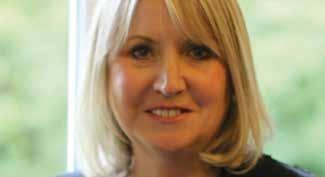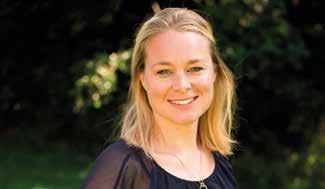
7 minute read
New from Fellows
Following the recent Governing Body meeting on 4 December 2019, Lucy Cavendish College was delighted to announce key appointments to its Fellowship. The new Fellows are strongly committed to the new direction of the College and its exciting plans to change its admissions criteria to include men and women from the standard university age. The new admissions policy reflects a clear commitment to widening participation and will come into effect from October 2021. The new Fellows will further address the College’s academic and skills needs, and pave the way for closer collaborations and stronger networking with specific entities in the University. As well as strengthening the College’s teaching, the Fellows will take up vital committee roles, drive fund-raising initiatives and contribute to the optimisation of the two co-curriculum strands (academic skills and employability). The new cohort also brings with them their strong links with enterprise and social innovation within the eco-system in Cambridge. Dr Isobel Maddison publishes in the Cambridge Companion to British Literature of 1930s Lucy Cavendish Fellow and English Director of studies Dr Isobel Maddison published a chapter titled ‘The Popular and the Middlebrow’ in the Cambridge Companion to British Literature of 1930s. This book offers the reader an incisive survey covering the decade’s literature and its status in critical debates. Across the chapters, sustained attention is given to writers of growing scholarly interest, to pivotal authors of the period, such as Auden, Orwell, and Woolf, to the development of key literary forms and themes, and to the relationship between this literature and the decade’s pressing social and political contexts. Through this, the reader will gain new insight into 1930s literary history, and an understanding of many of the critical debates that have marked the study of this unique literary era.
Dr Astrid Gall publishes in Virus Evolution on recombination in HIV
Advertisement
Astrid’s paper is titled ‘Pervasive and non-random recombination in near full-length HIV genomes from Uganda’. Recombination is an important feature of HIV evolution, occurring both within and between the major branches of diversity (subtypes). The Ugandan epidemic is primarily composed of two subtypes, A1 and D, that have been co-circulating for 50years, frequently recombining in dually infected patients. In this paper the team investigate the frequency of recombinants in this population and the location of breakpoints along the genome.
Professor Marie-Claire Cordonier Segger receives the Weeramantry International Justice Award
Marie-Claire received the 2020 International Justice Award for her outstanding legal scholarship and teaching, and for her leadership of international foundations, councils and networks including the Centre for International Sustainable Development Law (CISDL), the Climate Law and Governance Initiative with the United Nations Framework Convention on Climate Change, and the Biodiversity Law and Governance Initiative with the Convention on Biological Diversity and UN-Environment. The award recognises Prof. Cordonier Segger for her efforts to advance justice, human rights, protection of
nature and the interests of future generations.
Dr Neil Stott promoted at Cambridge Judge Business School
The Judge Business School recently announced that Dr Neil Stott has been promoted to Faculty (Professor level) in Management Practice, at Cambridge Judge Business School. Neil has alsobeen appointed Adjunct Professor at the Faculty of Business Administration, Memorial University of Newfoundland. He will continue to be co-director of the Cambridge Centre for Social Innovation, the Programme Director for the MSt in Social Innovation and is a Fellow and Director of Studies in Management Studies at Lucy Cavendish College.
Neil said: “It is amazing to be recognised for my practice,teaching and scholarship in social innovation. I hope to contribute further to Lucy Cavendish’s role in making social change and kindle the social innovation spark in our students.”
Dr Anna Git publishes in Scientific Reports
Dr Anna Git is the Director of Studies for Biological Science and SRA group leader at the Department of Biochemistry, as well as Visiting Scientist at CRUK Cambridge Institute. Anna’s paper ‘Enzyme- and gene-specific biases in reverse transcription of RNA raise concerns for evaluating gene expressions’ is published in Scientific Reports and it challenges basic assumptions about accurately measuring concentrations of RNA. Dr Matthew Sparkes wins Dame Anne Warburton Award Established to fund research, the award memorialises Dame Anne Warburton, former President of Lucy Cavendish College. Matthew won the award for his work researching the intersections between social class(ification), consumption, debt-based finance, and political economy. He comments: “I have been very fortunate to receive the Dame Anne Warburton funding to support my current research project, which aims to examine how credit scoring systems in the UK have class-like effects on people’s life chances. Since receiving the award, I have read about Dame Anne Warburton’s life and work, and was humbled by her extensive work in the public sector and for the College. Becoming aware of this has created a strong desire to utilise these funds in a way that honours her work and values.”

Dr Anne-Laura Van Harmelen accepted full Professorship at Leiden University

Dr Anne-Laura van Harmelen was appointed as Professor of Brain, Security and Resilience at the Institute of Education and Child Studies, Leiden University, Netherlands, with effect from 1 September 2020. She will focus on the brain in relation to the development of
transgressive behaviour and its prevention and treatment.
College Fellow and Director of Studies for Veterinary Medicine, Dr Jackie Brearley was appointed Senior Lecturer in Veterinary Education, in October 2019. As a result she has resigned from her Senior Lectureship in Veterinary Anaesthesia in which, for the past 4 years, she has been tasked with developing the clinical skills centre at the Cambridge Veterinary School. This new appointment gives a name to this role but also extends it to cover all the clinical skills facilities at the Vet School.
Ed Bullmore and team publish new paper on mental health and the impact of Covid-19
Prof Ed Bullmore, head of the Department of Psychiatry at the University of Cambridge and Fellow at Lucy Cavendish College co-authored the paper ‘Multidisciplinary research priorities for the COVID-19 pandemic: a call for action for mental health science’, published by Lancet Psychiatry. The paper identifies the urgent need for research into the impact of Covid-19 on mental health in order to minimise and manage the substantial, immediate and potentially long-term effects.
News from Research Fellows
Dr Sarah Morgan promoted to Senior Research Associate at the Department of Psychiatry
“My research focuses on two main themes. The first is using MRI brain images to better diagnose and understand schizophrenia. To do this I work as part of an EU-funded project called PSYSCAN. We recently published some initial results from the project showing a pattern of structural brain differences between patients with schizophrenia and healthy volunteers, which were remarkably reproducible across three independent datasets. We then related these structural brain differences to gene expression data, to uncover a cluster of genes which we believe merit further attention as potential anti-psychotic drug targets. The next step is to extend this research to new data from the PSYSCAN project, which includes brain images from over 500 subjects who either have early stage psychotic disorders or are at clinical high risk of developing them. I also lead a project using speech from patients with psychotic disorders to predict their disease progression, funded by The Alan Turing Institute ‘Towards incoherent speech as a predictor of psychosis risk.”
Dr Lorena Gazzotti awarded grant from the Royal Geographical Society
Dr Lorena Gazzotti is a Lucy Cavendish Alice Tong Sze Research Fellow, based at CRASSH during the period of her Fellowship. Earlier in the year Lorena was awarded £3000 from the Society for Libyan Studies as a pilot grant. Following the successful pilot, Lorena has received a further £3000 grant from the Royal Geographical Society and says: “I am extremely grateful for the grant awarded by the Jasmin Leila Award and Royal Geographical Society (with IBG). When I applied for this grant, the scenario that we are experiencing now was beyond unimaginable. The complete closure of borders and the implementation of lockdown measures around the world have questioned the way states have been providing care for the vulnerable, including unaccompanied and separated children, and how this impacts society at large. When travel bans will be lifted and research conditions will be safe again, social scientists will have the duty to record and interpret the new world that will unfold from the COVID19 crisis, and I will be happy to contribute my bit in the effort”. New GB Fellows
Dr Patricia Alireza Dr Jurgen Becque Jenny Blakesley Prof Ed Bullmore Professor Marie-Claire Cordonier Segger The Reverend Canon Adrian Daffern Dr Elizabeth Fistein Mr Christopher Fowell Dr Emily Gordon Derek Jones Dr Katie Keller Dr Mark King Dr Howard P Nelson Dr Matthew Sparkes Dr Neil Stott Dr Deborah Talmi Departing Fellows
Dr Victoria Harvey Dr Anne-Laura van Harmelen Dr Arathi Sriprakash
New Emeritus Fellows
Dr David Carter CVO Sarah Gull








